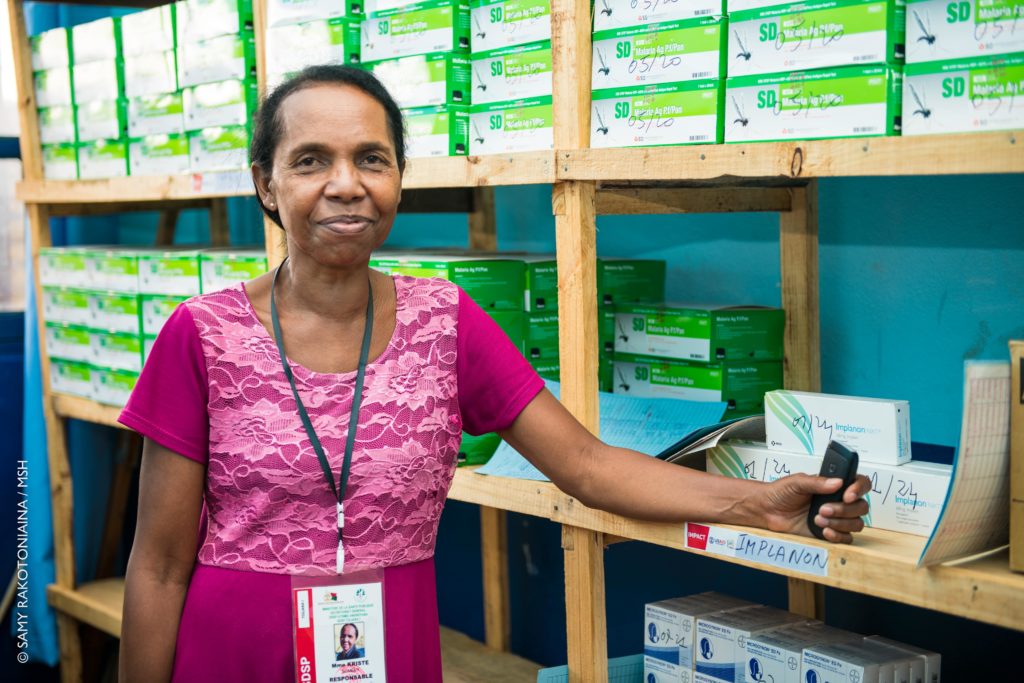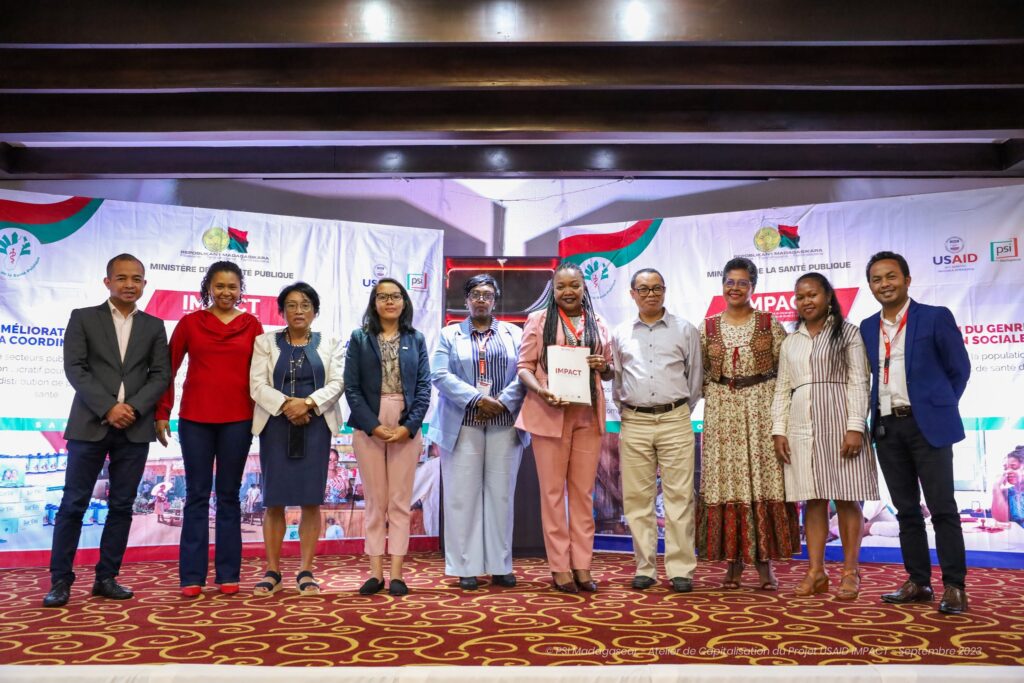Improving Market Partnerships and Access to Commodities Together
Improving Market Partnerships and Access to Commodities Together


IMPACT Leaves a Lasting Legacy on Madagascar’s Health System
Since 2018, the USAID-funded IMPACT program has helped strengthen the supply chain and improve pharmaceutical management practices in Madagascar. MSH and Population Services International (PSI) came together with consortium partners, Malagasy government representatives, and local health professionals to celebrate these achievements and mark the transfer of this work to the Ministry of Public Health (MOPH). IMPACT’s years of collaboration with the MOPH will help ensure the innovations and coordinated efforts of the program continue and grow for years to come.
Overview
Through a total market approach, the USAID-funded Improving Market Partnerships and Access to Commodities Together (IMPACT) program helped build Madagascar’s capacity to deliver quality health products to the Malagasy people. We worked with the government to strengthen its supply chain and increase cost efficiency while enabling the health system to harness private-sector contributions, including those from retail pharmaceutical outlets.
Led by Population Services International (PSI) with MSH, PATH, Banyan Global, and the Telma Foundation as partners, IMPACT worked with the USAID-funded, MSH-led ACCESS program to strengthen the health system and achieve sustainable health impacts. This six-year (2018–2024) cooperative agreement helped increase access to and use of effective health products by enhancing coordination among the public, nonprofit, and commercial sectors for reliable supply and distribution of quality health products; strengthening the capacity of the government of Madagascar to sustainably provide quality health products; expanding the engagement of the commercial health sector to serve new health markets according to health needs and consumer demand; improving the sustainability of social marketing to deliver affordable, accessible health products; and increasing demand for and use of health products among the Malagasy people, including piloting an accredited drug sellers initiative.
Throughout its six years of implementation, the IMPACT program:
- Improved pharmaceutical management practices: The program adapted and implemented the MSH Supervision, Performance Assessment, and Recognition Strategy (SPARS) approach across 78 district wholesale pharmacies, which uses a combination of staff training and performance reviews to improve the skillset of the health workforce and strengthen supply chain management.
- Prevented stock-outs of essential medications: By prioritizing quantification activities, the program ensured no stock-outs of malaria-related medicines and commodities between 2021 and 2023 despite supply chain challenges caused by the pandemic.
- Promoted regulatory systems strengthening: Between 2019 and 2023, the program facilitated efforts to clear a backlog of over 1,700 applications for medicine marketing authorization and helped reduce the processing time of marketing authorization applications from 2 years to 6 months, ensuring the safety and effectiveness of medicines and allowing them to be more readily available to patients.
- Enhanced data-driven decision-making: The program helped logistics and procurement management staff better utilize data from End-Use Verification surveys that monitor the availability of health care commodities, preventing stock-outs of rapid diagnostic test kits.
Collaborative Efforts to Ensure Nutritional Supplies in Madagascar: USAID’s IMPACT and ACCESS Programs Strengthen the Fight Against Malnutrition
In Madagascar, chronic malnutrition affects nearly 40% of children under five, exacerbated by poverty, food insecurity, and climate disasters. Local health centers struggle with stock-outs of essential nutritional supplements, hindering the treatment of severe malnutrition. To tackle this, MSH collaborates with local health officials to strengthen the supply chain, ensuring health centers have the necessary resources to combat malnutrition effectively.
Improving MNCH Supply Chain Performance in Malagasy District Pharmaceutical Warehouses through the SPARS Approach

Aline Mukerabirori
Senior Supply Chain Advisor
Project Contact
Aline Mukerabirori currently serves as MSH’s Chief of Party for the USAID-funded NextGen Efficient Supply Chains Advance Patient Engagement (ESCAPE) Activity. Mukerabirori is a highly experienced leader and manager with over 25 years of project management experience in international public health development, specifically in health systems strengthening, case management of malaria, HIV and AIDS, and supply chain management to improve access to life-saving commodities. Mukerabirori joined MSH in 2007 as Deputy Country Manager with MSH in Rwanda, where she supervised and coordinated the implementation of the USAID-funded Strengthening Pharmaceutical Systems (SPS) project. From 2018 to 2024, she served as Senior Supply Chain Advisor and Team Lead of MSH for the USAID Madagascar-funded Improving Market Partnerships and Access to Commodities Together (IMPACT) program, led by Population Services International, to strengthen the capacity of the government of Madagascar to sustainably provide quality health products to the Malagasy people. In 2011, Mukerabirori also served as Country Director for MSH in Burundi, managing two USAID-funded projects, including the Systems for Improved Access to Pharmaceutical Systems (SIAPS) and the Supply Chain Management Systems (SCMS) projects. She holds a MS in pharmaceutical sciences from the Université de Liege in Belgium.
Donors & Partners
Donors
The United States Agency for International Development
Partners
Population Services International
Banyan Global
PATH
Telma Foundation